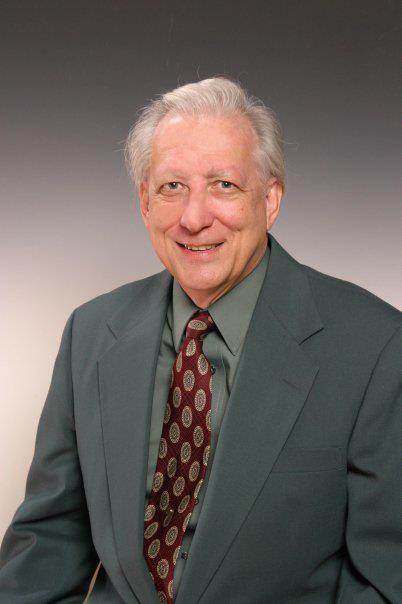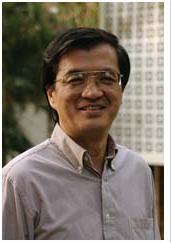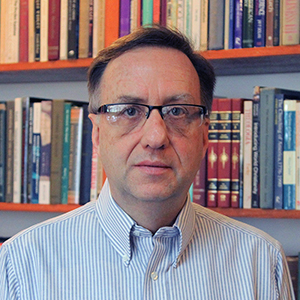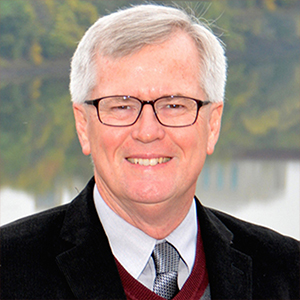In 1977 the General Board of the Church of the Nazarene approved a plan to establish a graduate Seminary to serve the Asia-Pacific region of the church. Dr. Donald Owens, Professor of Missions at Nazarene Theological Seminary in Kansas City, Missouri USA and formerly a missionary to Korea, was elected as founding president to head the new seminary, to become the first masters-level theological institution of the Church of the Nazarene located outside the United States.
In 1979, the church purchased a site in Taytay, Rizal, Philippines. Formerly an orphanage, the location consisted of ten acres with 22 wooden frame buildings. The proximity of the location to Manila was a deciding factor, as leaders hoped that the cosmopolitan setting would provide models for evangelism for the other cities of the Asia-Pacific region. While hosting seminars and extension classes for three years, Dr. Owens searched for faculty members and initiated construction of an administration and classroom building, while other buildings on the campus were renovated for student and faculty living. He devised the seminary logo, established the guiding scriptural text (2 Timothy 2:5) and the motto (“Bridging Cultures for Christ”), and chose the official hymn (In Christ there is No East or West). Approval to begin as an educational institution for non-immigrant students was received from the Philippines’ Commission on Immigration and Deportation, and regular classes began on November 14, 1983, with students enrolled from the Philippines, India, and Japan. The Seminary was formally dedicated, and the faculty installed on January 15, 1984.

In April 1984, Dr. E. LeBron Fairbanks, formerly Academic Dean of European Nazarene Bible College and at the time teaching at Southern Nazarene University, was elected as second president of the Seminary. He began serving in July 1984, and he and his family moved to Manila later that year.
During his tenure, the seminary developed its mission statement and institutional objectives and focused on developing servant leadership and excellence in ministry. President Fairbanks pursued recognition and accreditation from the Philippine government, and in 1988, full recognition was received from the Commission on Higher Education (CHED) and accreditation for degree programs was granted by the Asia Theological Association (ATA).
The library was strengthened, extensive renovation and building programs continued, and faculty numbers and scope of teaching grew.
Upon the election of Dr. Fairbanks as president of Mount Vernon Nazarene University, the Board of Trustees elected Dr. John Nielson, Vice-President of Eastern Nazarene College and formerly a missionary to Denmark, as the third President of APNTS. He and his wife Janice settled in Manila in February 1990, teaching pastoral ministry and Christian education.
Dr. Nielson’s theme through his years at APNTS was building a “Christ-culture” transcending national and ethnic cultures, with the first students from Thailand, Papua New Guinea, Bangladesh, South Africa, and Myanmar enrolled, and stressing the importance of worship, overseeing the renovation of the chapel.
The school began national culture day chapel presentations, small “covenant” groups began on campus, and Mrs. Nielson began “Kids’ Klubs” to reach out to community children on Saturday mornings.
The Mediator, the official journal of the school, began publication in 1996, and scholarship partnerships and endowments began for Nazarene students and those from “sister” denominations, especially the Wesleyan and the Free Methodist Church.


After the resignation of Dr. Nielson in 2001 to accept ministry assignments in Europe and the United States, the APNTS Board of Trustees chose Dr. Hitoshi (Paul) Fukue as the seminary’s fourth president in 2003. Dr. Fukue had served for many years as a pastor in Japan, as president of Japan Christian Junior College, and as a member of the APNTS faculty since 2001.
During Dr. Fukue’s service as president, construction of the Nielson Center for Education and Evangelism began, a new Master of Science in Theology program was developed, and the Donald Owens School of World Mission was established. The seminary underwent a series of planning and mission review processes, and a five-year plan with strategic objectives resulted.
Dr. Fukue taught theology, ethics, sociology of religion and preaching, and his wife Mitsuko taught interpersonal and intercultural communication. In May 2007, Dr. Fukue resigned to reassume pastoral ministry in Japan.
During 2001-03 and 2007-08, Dr. Floyd Cunningham, as Academic Dean, had served as Officer-in-Charge and as Interim President. In June 2008, he was elected as the fifth president of APNTS and was installed during the school’s 25th anniversary in November 2008.
Dr. Cunningham was responsible for the opening of extension programs in Papua New Guinea and Myanmar, the construction of the Volunteer Mission Center (VMC), the near-completion of the Nielson Center for Education and Evangelism, and the establishment of Bresee Institute East to promote urban ministry.
In April 2008, in partnership with Compassion International, APNTS initiated Holistic Child Development (HCD) programs at the Certificate, Diploma and Master’s, and, eventually, Ph.D. levels. The Ph.D. program was undertaken in partnership with the Asia Graduate School of Theology (AGST) and was granted official recognition in January 2012.
In addition to the emphasis on children in crisis, APNTS expanded ministries to the community and built partnerships with various church, para-church, and non-government bodies. New students arrived from Columbia, Ethiopia, Kenya, Nigeria, Peru, and Russia. Dr. Cunningham returned to his role as Academic Dean after his term as president ended, serving in interim leadership until a new president arrived.


Dr. Seung-An Im, former President of Korea Nazarene University, was elected as the sixth president by the Board of Trustees in March 2013 and was installed in January 2014. As president, Dr. Im emphasized the value of holistically preparing students for ministry.
He initiated the “BEST” program, emphasizing graduates who mastered the Bible, are responsible to the Ecclesial community, are Socially-minded, and who are committed to proceeding Toward the global /local mission of Christ. During his tenure, an accelerated English program (AEP) was launched while strengthening special programs for additional assistance in English, a renewed emphasis on student services began, and the Master of Ministry degree program expanded into additional off-site locations.
Dr. Im’s love for students and passion for promoting APNTS and his skill at building connections to churches and leaders throughout the Asia-Pacific region were marks of his leadership. In 2016 he returned to Korea Nazarene University as president yet continues to work closely with APNTS on cooperative undertakings.
In July 2016, Dr. Bruce Oldham was elected as the seventh president of APNTS. With twenty-two years of higher education experience in Nazarene universities in the United States, Dr. Oldham had served in pastoral ministry for thirteen years and as global president of Nazarene Youth International during 1995-2001.
He began his tenure in September 2016 and wife Peggy joined the faculty in November, also having served Nazarene universities in student development leadership and teaching in adult student programs at the undergraduate and masters level for many years.
Since their arrival, a renovation of the campus dining hall has begun, administrative systems and academic processes are being revamped, and new partnership initiatives are being developed for enrollment growth and financial stability, enabling a new strategic vision for the seminary’s future.

More than 500 graduates of APNTS have gone on to pastoral, teaching, missionary, administrative and many other creative forms of ministry in various countries, including Australia, Cambodia, Canada, China, Hong Kong, India, Indonesia, Japan, Korea, Mongolia, Myanmar, Nepal, New Zealand, Papua New Guinea, the Philippines, Samoa, Taiwan, Thailand, the United States and Zimbabwe. Seventeen nations are represented among the current study body, studying in five masters programs, four doctoral programs, and a variety of undergraduate credit, certificate, and diploma programs. With a blessed history, the future of APNTS looks even brighter!